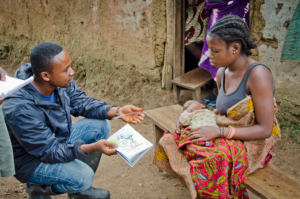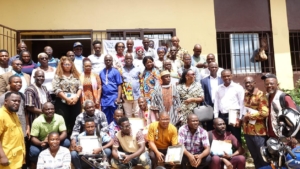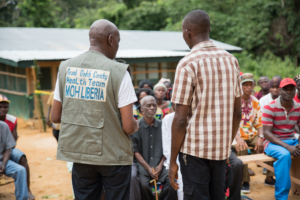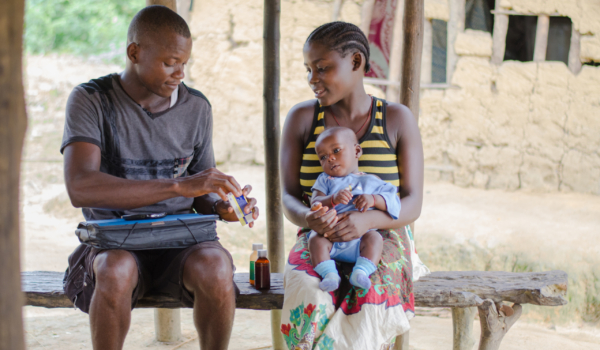On June 30, 2024, Last Mile Health handed over the direct management of the National Program in Grand Gedeh to the county health team, fulfilling a key milestone in our Liberia strategy.
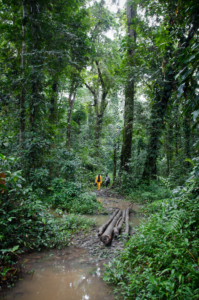
Reaching the last mile: community health workers on the way to visit patients in Zeagbeh, Grand Gedeh County.
Last Mile Health’s journey started in Grand Gedeh County. In the wake of more than a decade of civil war that left Liberia’s health system devastated, we launched Liberia’s first rural, public HIV treatment program in Zwedru, and went on to pilot our community health worker model in Konobo District. After just one year—despite the extraordinary challenges in reaching this remote district—teams of community and frontline health workers achieved 100% coverage, resulting in an increase in clinic-based skilled birth attendance from 55% to 84%. The work in Grand Gedeh was not only Last Mile Health’s foundation, but also the Government of Liberia’s foundation for the country’s first national community health worker program. Now, more than 5,000 community health workers deliver primary care to patients across the country. As of June 2024, the National Community Health Program has achieved national scale, deploying a community health worker in every rural and remote community in Liberia.
Since the national program’s launch in 2016, Last Mile Health has directly managed the program’s implementation in three counties, each with its own learning agenda. Rivercess serves as the innovation county, where we pilot new interventions and tactics prior to national rollout. Grand Bassa serves as an evaluation county, where we implement the national policy with fidelity and measure the impact of the program on primary healthcare access and community health outcomes. And Grand Gedeh serves as a transition county, where we model handover from an NGO partner to Ministry management. This transition aligns with the Ministry’s longstanding vision for self-administration of the program, which has prompted the Ministry to hold initial engagements with the World Bank to cover costs of direct delivery of the national program by the Grand Gedeh County Health Team. This is a remarkable testament to the advocacy and shared vision of the Ministry and the Last Mile Health Liberia team.
We are deeply grateful to the staff who have advanced our work in Grand Gedeh, built a strong partnership with the county health team, and overseen this transition. Their work and commitment to our mission has made this important step possible—and has driven measurable, compelling improvements in access to care in Grand Gedeh. While working alongside the county health team to drive these gains, Last Mile Health’s team has also accompanied the team to improve its capacity to manage the program directly. We are committed to helping ensure the program continues to deliver quality primary health services, with community health workers receiving the support they need to provide care. We will continue to support the county health team in key ways: monitoring service delivery, measuring policy fidelity, and influencing financing to maintain the strong gains made in Grand Gedeh even after we have transitioned its management. We will work together with the Ministry, providing technical assistance to identify new challenges and develop solutions that are sustainable and effective. The lessons we learn alongside the county health team will inform other counties working toward similar transitions to full government management.
Our commitment in Liberia is stronger than ever, focused on lasting impact. In order for our work to enact long-term, systemic change, it’s critical that governments can effectively sustain the programs we have worked together to design and build. Transition to direct government management will not be easy but it is an essential step: this is the durability we need as we build a blueprint for exemplary community health systems.
Liberia’s National Community Health Program has already proven that it’s possible to bring a health worker within reach to provide quality community-level care to all people, no matter where they live. Together, we can ensure this change lasts and its impact grows—for those in Grand Gedeh and in every rural and remote community.

